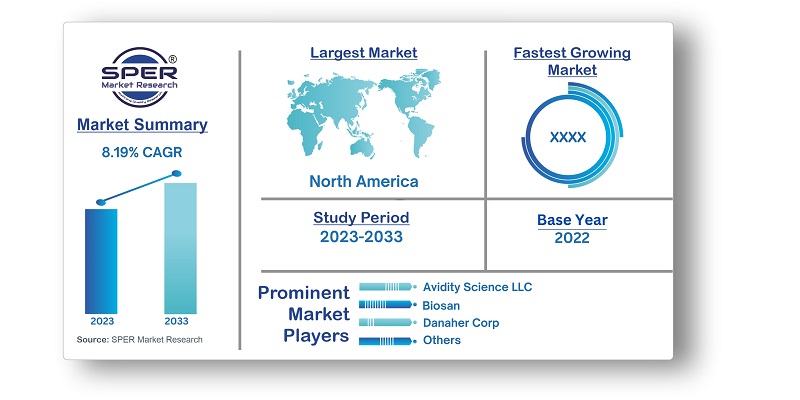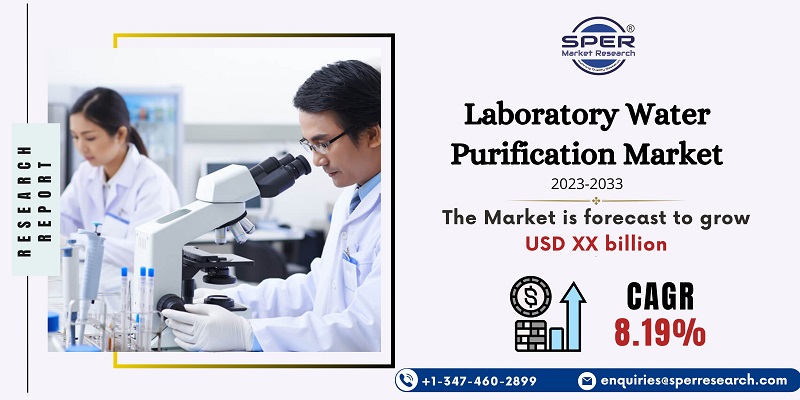
Laboratory Water Purification Market Growth, Size, Trends, Demand, Revenue and Future Outlook
Laboratory Water Purification Market By Technology, By Product Type, By End User- Regional Outlook, Competitive Strategies and Segment Forecast to 2033
| Published: Jan-2024 | Report ID: MACH2406 | Pages: 1 - 225 | Formats*: |
| Category : Equipment and Machinery | |||
- October 2022: Globally recognized pioneer in air filtration technology, Erlab Inc., and Labconco Corporation have entered into a new exclusive agreement. It is anticipated that this agreement will promote greener lab design
- February 2023: In order to increase its market share in Texas, Evoqua Water Technologies LLC purchased Kemco Systems' industrial water service division.


| Report Metric | Details |
| Market size available for years | 2019-2033 |
| Base year considered | 2022 |
| Forecast period | 2023-2033 |
| Segments covered | By Product Type, By Technology, By End User |
| Regions covered | North America, Asia-Pacific, Latin America, Middle East & Africa and Europe |
| Companies Covered | Avidity Science LLC, Biobase Biodusty Shandong Co. Ltd., Biosan, Danaher Corp., Evoqua Water Technologies LLC, Heal Force Biomeditech Holdings Ltd., Labconco Corp., LOC Scientific Inc., Marlo Inc, MembraPure GmbH |
- Healthcare Institutions
- Research Laboratories
- Pharmaceutical and biotechnology companies
- Academic laboratories
- Others
| By Product Type: |
|
| By Technology: |
|
| By End User: |
|
- Global Laboratory Water Purification Market Size (FY’2023-FY’2033)
- Overview of Global Laboratory Water Purification Market
- Segmentation of Global Laboratory Water Purification Market By Product Type (Bench top laboratory water purifiers, Central laboratory water purifiers, Portable laboratory water purifiers).
- Segmentation of Global Laboratory Water Purification Market By Technology (Filtration, Ion Exchange, Reverse Osmosis, Others )
- Segmentation of Global Laboratory Water Purification Market By End User (Healthcare Institutions, Research Laboratories, Pharmaceutical and biotechnology companies, Academic laboratories, Others )
- Statistical Snap of Global Laboratory Water Purification Market
- Expansion Analysis of Global Laboratory Water Purification Market
- Problems and Obstacles in Global Laboratory Water Purification Market
- Competitive Landscape in the Global Laboratory Water Purification Market
- Impact of COVID-19 and Demonetization on Global Laboratory Water Purification Market
- Details on Current Investment in Global Laboratory Water Purification Market
- Competitive Analysis of Global Laboratory Water Purification Market
- Prominent Players in the Global Laboratory Water Purification Market
- SWOT Analysis of Global Laboratory Water Purification Market
- Global Laboratory Water Purification Market Outlook and Projections (FY’2023-FY’2033)
- Recommendations from Analyst
1.1. Scope of the report1.2. Market segment analysis
2.1. Research data source2.1.1. Secondary Data2.1.2. Primary Data2.1.3. SPER’s internal database2.1.4. Premium insight from KOL’s2.2. Market size estimation2.2.1. Top-down and Bottom-up approach
2.3. Data triangulation
4.1. Driver, Restraint, Opportunity and Challenges analysis4.1.1. Drivers4.1.2. Restraints4.1.3. Opportunities4.1.4. Challenges
4.2. COVID-19 Impacts of the Global Laboratory Water Purification Market
5.1. SWOT Analysis5.1.1. Strengths5.1.2. Weaknesses5.1.3. Opportunities5.1.4. Threats5.2. PESTEL Analysis5.2.1. Political Landscape5.2.2. Economic Landscape5.2.3. Social Landscape5.2.4. Technological Landscape5.2.5. Environmental Landscape5.2.6. Legal Landscape5.3. PORTER’s Five Forces5.3.1. Bargaining power of suppliers5.3.2. Bargaining power of buyers5.3.3. Threat of Substitute5.3.4. Threat of new entrant5.3.5. Competitive rivalry5.4. Heat Map Analysis
6.1. Global Laboratory Water Purification Market Manufacturing Base Distribution, Sales Area, Product Type6.2. Mergers & Acquisitions, Partnerships, Product Launch, and Collaboration in Global Laboratory Water Purification Market
7.1. Global Laboratory Water Purification Market Value Share and Forecast, By Product Type 2023-20337.2. Benchtop laboratory water purifiers7.3. Central laboratory water purifiers7.4. Portable laboratory water purifiers7.5. Others.
8.1. Global Laboratory Water Purification Market Value Share and Forecast, By Technology 2023-20338.2. Filtration8.3. Ion Exchange8.4. Reverse Osmosis8.5. Others
9.1. Global Laboratory Water Purification Market Size Value Share and Forecast, By End User 2023-20339.2. Academic laboratories9.3. Healthcare Institutions9.4. Pharmaceutical and biotechnology companies9.5. Research Laboratories9.6. Others.
10.1. Global Laboratory Water Purification Market Size and Market Share
11.1. Global Laboratory Water Purification Market Size and Market Share, By Product Type (2019-2026)
11.2. Global Laboratory Water Purification Market Size and Market Share, By Product Type (2027-2033)
12.1. Global Laboratory Water Purification Market Size and Market Share, By Technology (2019-2026)12.2. Global Laboratory Water Purification Market Size and Market Share, By Technology (2027-2033)
13.1. Global Laboratory Water Purification Market Size and Market Share, By End User (2019-2026)13.2. Global Laboratory Water Purification Market Size and Market Share, By End User (2027-2033
14.1. Global Laboratory Water Purification Market Size and Market Share, By Region (2019-2026)14.2. Global Laboratory Water Purification Market Size and Market Share, By Region (2027-2033)
14.3. Asia-Pacific14.3.1. Australia14.3.2. China14.3.3. India14.3.4. Japan14.3.5. South Korea14.3.6. Rest of Asia-Pacific14.4. Europe14.4.1. France14.4.2. Germany14.4.3. Italy14.4.4. Spain14.4.5. United Kingdom14.4.6. Rest of Europe14.5. Middle East and Africa14.5.1. Kingdom of Saudi Arabia14.5.2. United Arab Emirates14.5.3. Rest of Middle East & Africa14.6. North America14.6.1. Canada14.6.2. Mexico14.6.3. United States14.7. Latin America14.7.1. Argentina
14.7.2. Brazil14.7.3. Rest of Latin America
15.1. Avidity Science LLC15.1.1. Company details15.1.2. Financial outlook15.1.3. Product summary15.1.4. Recent developments15.2. Biobase Biodusty Shandong Co. Ltd.15.2.1. Company details15.2.2. Financial outlook15.2.3. Product summary15.2.4. Recent developments15.3. Biosan15.3.1. Company details15.3.2. Financial outlook15.3.3. Product summary15.3.4. Recent developments15.4. Danaher Corp15.4.1. Company details15.4.2. Financial outlook15.4.3. Product summary15.4.4. Recent developments15.5. Evoqua Water Technologies LLC15.5.1. Company details15.5.2. Financial outlook15.5.3. Product summary15.5.4. Recent developments15.6. Heal Force Biomeditech Holdings Ltd15.6.1. Company details15.6.2. Financial outlook15.6.3. Product summary15.6.4. Recent developments15.7. Labconco Corp15.7.1. Company details15.7.2. Financial outlook15.7.3. Product summary15.7.4. Recent developments15.8. LOC Scientific Inc15.8.1. Company details15.8.2. Financial outlook15.8.3. Product summary15.8.4. Recent developments15.9. Marlo15.9.1. Company details15.9.2. Financial outlook15.9.3. Product summary15.9.4. Recent developments15.10. MembraPure GmbH15.10.1. Company details15.10.2. Financial outlook15.10.3. Product summary15.10.4. Recent developments15.11. Others
SPER Market Research’s methodology uses great emphasis on primary research to ensure that the market intelligence insights are up to date, reliable and accurate. Primary interviews are done with players involved in each phase of a supply chain to analyze the market forecasting. The secondary research method is used to help you fully understand how the future markets and the spending patterns look likes.
The report is based on in-depth qualitative and quantitative analysis of the Product Market. The quantitative analysis involves the application of various projection and sampling techniques. The qualitative analysis involves primary interviews, surveys, and vendor briefings. The data gathered as a result of these processes are validated through experts opinion. Our research methodology entails an ideal mixture of primary and secondary initiatives.



Frequently Asked Questions About This Report
PLACE AN ORDER
Year End Discount
Sample Report
Pre-Purchase Inquiry
NEED CUSTOMIZATION?
Request CustomizationCALL OR EMAIL US
100% Secure Payment






Related Reports
Our Global Clients
Our data-driven insights have influenced the strategy of 200+ reputed companies across the globe.






















